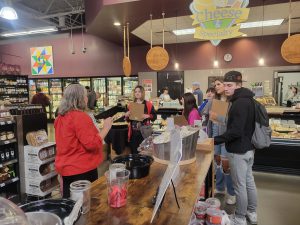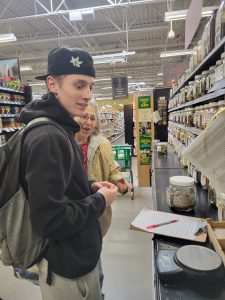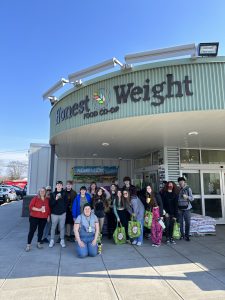When you think of a high school science class field trip, one doesn’t necessarily think of going to a grocery store, but that’s just what students in Mrs. Maddalena’s Environmental Science class did on their quest to learn about sustainable agriculture.
 However, they didn’t visit a typical grocery store like Price Chopper or Hannaford. Instead, the 15 students toured the Honest Weight Food Co-op in Albany, a member-owned and operated grocery market “committed to providing affordable, high-quality, natural foods and products for healthy living.” Their products are free of artificial preservatives, colors, flavors, growth hormones, high fructose corn syrup and other harmful ingredients.
However, they didn’t visit a typical grocery store like Price Chopper or Hannaford. Instead, the 15 students toured the Honest Weight Food Co-op in Albany, a member-owned and operated grocery market “committed to providing affordable, high-quality, natural foods and products for healthy living.” Their products are free of artificial preservatives, colors, flavors, growth hormones, high fructose corn syrup and other harmful ingredients.
The visit was part of their unit on sustainable agriculture, which means “farming in a way to protect the environment, aid and expand natural resources and to make the best use of non-renewable resources.”
Prompted by their teacher to think about where their ingredients come from when preparing a meal and how sustainable the ingredients are, students came away with a new appreciation of the way they think about their food.
 “The field trip showed me a different place to buy food,” said junior Christian DeChiaro, who enjoyed the experience so much that he wants to bring his mother there to shop. “The food from the Co-op comes from local farms which helps our community and means the food is fresher. And because it is local, there is less gas used transporting it to the stores.”
“The field trip showed me a different place to buy food,” said junior Christian DeChiaro, who enjoyed the experience so much that he wants to bring his mother there to shop. “The food from the Co-op comes from local farms which helps our community and means the food is fresher. And because it is local, there is less gas used transporting it to the stores.”
Mrs. Maddalena said they particularly enjoyed learning about bulk shopping.
Students were given mason jars to choose what they wanted from the bulk food section, which included products such as dried fruits and nuts, nut butters, oils grains, cereals, spices, teas, coffees, baking products, and more.
While most students chose something edible such as chocolate covered fruits, gummies and granola, one student filled her jar with hand cream. You can even bring your empty soap bottle, milk jug or water bottle to refill them, which adds to sustainability by decreasing waste. 
“Reducing waste from packaging is another focus in Environmental Science,” said Mrs. Maddelena. “Students took note of the reduced packaging and plastics throughout the store.”
They also learned about “food miles,” which means how far a food travels before reaching the consumer, how much carbon dioxide is used in terms of shipping and production and getting the waste to the landfill.
The visit was a fun way to learn hands-on about what they are learning in the classroom. Teaching students about sustainability now will have long-lasting effects as they become adults.
“Sometimes it just takes little changes to make a big impact,” said Mrs. Maddalena.